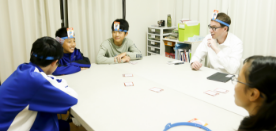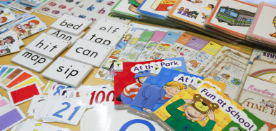Hello everyone,
How’s it going? I enjoyed the Mamachari bicycle race at Fuji Speedway last Sunday. I won’t write at length about it -you can read the previous three posts on this blog for more- but I really enjoyed it. I was very surprised the panda team won. I came away from it with a sunburned face but luckily not sore legs.
みなさん、こんにちは 😆 。
いかがおすごしですか?
私は、先週の日曜日に富士スピードウェイで行われた「ままちゃりレース」を楽しみました。
前の3つのブログにも「ママチャリレース」のことが書いてあるので、長々とそれについては書きませんが・・本当に楽しかったです。パンダのチームが優勝したのには驚きました。
顔がかなり焼けましたが、足は筋肉痛になりませんでした 😆 。
Last Friday I spoke to a junior high school student of mine in the waiting room, after he’d just arrived. I said, “How’s it going?”. He looked a little panicked and stared blankly at me. I usually say, “How are you?” which means basically the same thing but he hadn’t heard it before. After about 30 seconds of repeating myself, I eventually told him it means “How are you?” and he gave me the usual junior high school answer of “I’m tired”. If he’d thought a little he probably could have guessed what I meant. I think I’ll keep asking him a different version of “How are you?” every week until he gets the idea. A difficult thing about learning English (or any language) is that there are lots of different ways of saying the same thing. You can’t just learn one and expect everyone to use that phrase. Consider “How are you?.
Here are just some of the different ways of asking that question or similar:
先週の金曜日、待合室にいた中学生のある生徒に話しかけました。私は、「How’s it going?」と尋ねると
彼はすこしパニックぎみで、ポカーンと私をみていました。これはHow are you?と同じ意味なのですが、彼はこの言い回しを聞いたことがなかったのです。しばらくして、私が「How are you?」ってことだよと打ち明けると、彼は中学生のお決まりの答えである「I’m tired」(疲れてます)と答えました。
たぶん、少し考えれば「How’s it going?」の意味は分かったとおもいます。彼が考え付くまで毎週、
ちがう言い回しのあいさつをしていこうと思います。
英語を学ぶことのむずかしさは、同じ意味でもいろんな言い回しがあるということです。
1つだけ知ってればいいものではなく、また皆が同じ言い回しをすると考えてはいけません。
たとえば、「How are you?」(元気ですか)を例にとってみると・・・・
これだけの言い回しがあります。
How’s it going? What’s up? How’s things? (Yes, it’s grammatically incorrect but widely used by native speakers)
How are things with you?
How are you doing?
How are feeling?
How are you today?
How have you been?
How’ve you been recently?
How’s life?
How’s life treating you?
I could go on. It’s something I find difficult about Japanese (How many different kanji for rice do you really need?). It’s an important skill to learn. You can usually figure out what people are saying by the situation you’re in even if they use a new word or phrase. Otherwise, you can always just ask, “What do you mean?”. I’m going to try hard to make my students better at this.
Thanks for reading. Have a good week,
この例以外にもまだあります。日本語にも難しい点はあります。(同じ意味を表す漢字が多いです)
たとえ新しい単語やフレーズをつかっているとしても、たいていは今の状況から推測することができます。それでもわからなかったら、「what do you mean?」(どういう意味)ときけばいいのです。
私はこれから生徒たちにチャレンジさせるために新しいフレーズをどんどん使っていこうと思います。
読んでいただき、ありがとうございます 😀 。
皆さん、よい週をお過ごしください。
ケビン・グレニー







 当校の特徴
当校の特徴
